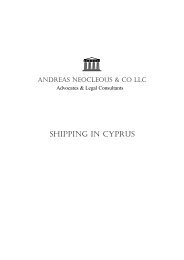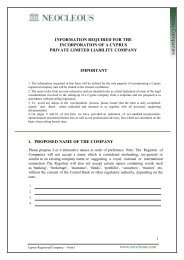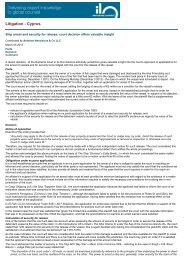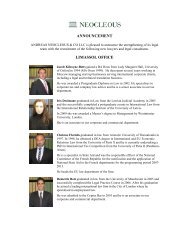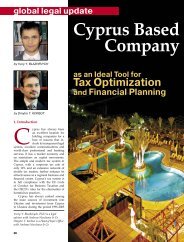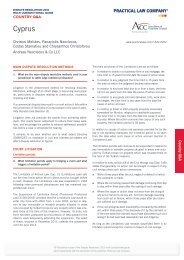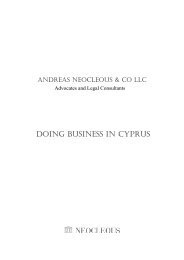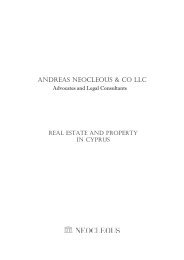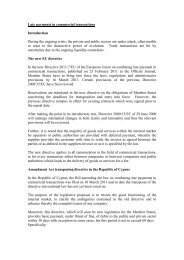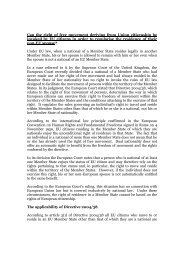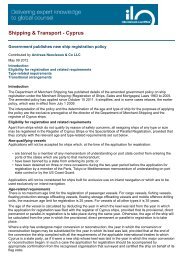The Private Wealth & Private Client Review - Andreas Neocleous & Co
The Private Wealth & Private Client Review - Andreas Neocleous & Co
The Private Wealth & Private Client Review - Andreas Neocleous & Co
- No tags were found...
Create successful ePaper yourself
Turn your PDF publications into a flip-book with our unique Google optimized e-Paper software.
contentsEditor’s Preface ................................................................................................. 1John RichesChapter 1 EU DEVELOPMENTS .......................................................... 5Richard FrimstonChapter 2CROSS-BORDER CONSIDERATIONS FORMATRIMONIAL PROPERTY ............................................... 9James <strong>Co</strong>psonChapter 3 ARGENTINA........................................................................ 15Juan McEwanChapter 4 BELGIUM ............................................................................. 24Anton van Zantbeek, Ann Maelfait and Joris DrayeChapter 5 BERMUDA ........................................................................... 37Alec Ross AndersonChapter 6 BRAZIL ................................................................................. 48Humberto de Haro SanchesChapter 7 BRITISH VIRGIN ISLANDS .............................................. 58Christopher McKenzie and Long Lee SyinChapter 8 CANADA .............................................................................. 70Margaret R O’Sullivan and Claudia A SgroChapter 9 CAYMAN ISLANDS ............................................................ 84Andrew Miller and Long Lee SyinChapter 10 CYPRUS ................................................................................ 92Elias <strong>Neocleous</strong> and Philippos AristotelousChapter 11 FRANCE ............................................................................. 102Line-Alexa GlotinChapter 12 GERMANY ......................................................................... 112<strong>Andreas</strong> Richter and Jens EscherChapter 13 GIBRALTAR ....................................................................... 120Adrian Pilcherviii
<strong>Co</strong>ntentsChapter 14 INDIA 132Hanisha Amesur and Bijal AjinkyaChapter 15 IRELAND 142Nora Lillis and Carol HoganChapter 16 ISRAEL 155Ran Artzi, Alon Kaplan, Lyat Eyal, Sando Eyal, Hagi ElmekiesseChapter 17 LIECHTENSTEIN 167Markus Summer and Hasan InetasChapter 18 LUXEMBOURG 182Simone RetterChapter 19 MEXICO 198Francisco Javier Arce Gargollo,WernerVegaTrapero andTomásO’GormanMerinoChapter 20 NETHERLANDS 207Alain Nijs, Dirk-JanMaasland, Frank DeurvorstandWouterVerstijnenChapter 21 NEW ZEALAND 218Geoffrey <strong>Co</strong>neChapter 22 PANAMA 230Luis G ManzanaresChapter 23 SINGAPORE 240Sim Bock EngChapter 24 South Africa 253Hymie Reuvin Levin and Gwynneth Louise RoweChapter 25 SPAIN 264Pablo AlarcónChapter 26 SWITZERLAND 273Xavier Oberson and Alara E YaziciogluChapter 27 UNITED KINGDOM 284Christopher GrovesChapter 28 United States 295Leigh-Alexandra BashaAppendix 1Appendix 2About the Authors305<strong>Co</strong>ntributing LAW Firms’ contact details321x
Editor’s Preface<strong>The</strong>re are three dominant themes that have emerged in the last year as ones of criticalimportance for advisers to wealthy families. <strong>The</strong>se themes are the morality of tax planning,the changing relationship between taxpayers and Revenue authorities and expectationsfor transparency in disclosure of asset holding structures. It is no surprise that thesethemes are intimately linked.With regard to the subject of the morality of tax planning, there is clearly aconcerted effort being made by governments in OECD jurisdictions to create an ethicalclimate not only in which tax evasion is reviled as criminal activity (as it rightly shouldbe) but also in which ‘aggressive’ tax planning is regarded with disdain and stigmatised.It is apparent that politicians and policymakers alike are responding to what is clearlya perceived swing in public opinion that is not unlike that which occurred in the early1930s. <strong>The</strong> arguments advanced in favour of encouraging taxpayers to see it as theirmoral duty (as well as legal obligation) to pay taxes and to refrain from indulgingin aggressive avoidance are based on the proposition that the wealthiest members ofsociety should make a proportionate contribution to public services and support thoseless fortunate than themselves. As a basic proposition this is clearly correct. <strong>The</strong> debatebecomes rather more problematic when complex arguments are reduced to simplisticsound bites especially in the context of a perception of what is regarded as aggressivetax planning – it is notable in the UK in the aftermath of the Spring Budget of 2012,when the government had proposed capping the amount of relief available to taxpayersto a maximum of 25 per cent of an individual’s annual income, serious commentatorswere suggesting that the individuals who made significant contributions to charity andclaimed tax relief were in some way engaging in aggressive tax avoidance. This is justa small example of the way in which the rhetoric of debate over tax policy becomesswirled in confusion – frequently, there is a tendency to characterise certain aspects of taxsystems that are deliberate reliefs or exemptions as loopholes.<strong>The</strong>re is also some irony in the fact that this proposal was withdrawn in responseto a concerted campaign from the voluntary sector – an argument that could have beenadvanced in defence of the proposal was that allowing unlimited tax deductions forcharitable donations might be seen as a form of hypothecation in which individuals withsufficient funds could substitute donations to their favoured charities for contributionsto the basic services which other taxpayers effectively support. This reasonable defence ofthe proposal was somewhat lost in the furore and never effectively advanced.One especially concerning aspect of the debate about the morality of tax planningis the absence of any parallel emphasis upon the duty of tax authorities to produce clear1
Editor’s Prefaceand fair rules of taxation that could be easily understood and applied – if one sees therelationship between taxpayer and tax authority as akin to a ‘social contract’ then therehas been rather too little emphasis upon the duties of tax authorities to refrain fromill-thought out changes to tax statutes or from producing sweeping anti-avoidance rulesthat create huge uncertainty for both individuals and businesses.Regardless of this, it would seem that in the years ahead, those of us acting asadvisers to wealthy families will need to ensure that in delivering our advice on what isan appropriate tax strategy to our clients, we bear in mind the possibility that, in future,the actions of our clients (and indeed our own advice) are likely to be judged not justfor their technical accuracy, as is legally appropriate, but also for their ‘moral’ content.In the prevailing climate, it will be important for us to highlight for clients whether thetax planning strategy being considered may risk being seen as unduly aggressive even ifit is legally correct.One positive development in the area of relationships between Revenueauthorities and wealthy taxpayers is the introduction of high net worth (‘HNW’) unitsin many OECD countries. <strong>The</strong>se units look to provide a greater degree of coordinationin overseeing the usually more complex tax affairs of wealthy individuals and the abilityfor a taxpayer’s professional adviser (in some cases) to foster an enhanced relationshipof openness with the HNW unit – given that in many jurisdictions the principle ofself-assessment places an onus upon taxpayers to highlight areas of uncertainty so thatthe Revenue authority can consider them. It could well be the case in future that thosetaxpayers will find their long-term interests are better served by erring on the side oftransparency in their dealings with Revenue authorities. In many jurisdictions, the abilityto seek advance rulings is one route to achieving greater certainty; in others, ensuringone’s tax adviser has well-placed contacts with Revenue authorities is an alternative.<strong>The</strong> traditional climate of mutual suspicion that has historically been characteristic ofdealings between taxpayers and tax authorities will not evaporate overnight. <strong>The</strong> evidenceemerging in other sectors (notably that of large corporate taxpayers) is, however, that inmany cases, a more transparent approach will serve the client’s interests and also mayreduce compliance costs. This is not to suggest that the role of the tax adviser shouldnot be to defend and advance the client’s interests robustly on specific tax issues but tosuggest that advisers also consider how to achieve an optimal outcome bearing in mindthat it is in the client’s long-term best interests to remain in good standing with the taxauthorities.Moving to my final and third theme, the publication by the OECD in February2012 of its updated guidance in respect of the FATF 40 recommendations and theexpanded interpretive notes accompanying them 1 are the latest manifestation at thesupranational level of policymakers seeking to force through a transparency agenda forinternational holding structures in their fight against tax evasion. I set out below somecomments from interpretive guidance on Recommendation 24 commenting on bearershare arrangements.1 See www.fatf-gafi.org/media/fatf/documents/recommendations/pdfs/FATF%20Recommendations%20approved%20February%202012%20reprint%20March%202012.pdf – see inparticular pp. 82–87 with interpretive notes on recommendations 23 and 24.2
Editor’s Preface14. <strong>Co</strong>untries should take measures to prevent the misuse of bearer shares and bearer sharewarrants, 2 for example by applying one or more of the following mechanisms: (a) prohibitingthem; (b) converting them into registered shares or share warrants (for example throughdematerialisation); (c) immobilising them by requiring them to be held with a regulated financialinstitution or professional intermediary; or (d) requiring shareholders with a controlling interestto notify the company, and the company to record their identity.15. <strong>Co</strong>untries should take measures to prevent the misuse of nominee shares and nomineedirectors, for example by applying one or more of the following mechanisms: (a) requiring nomineeshareholders and directors to disclose the identity of their nominator to the company and to anyrelevant registry, and for this information to be included in the relevant register; or (b) requiringnominee shareholders and directors to be licensed, for their nominee status to be recorded incompany registries, and for them to maintain information identifying their nominator, and makethis information available to the competent authorities upon request.It will be seen from this that the underlying philosophy to the FATF guidance is that anyarrangement that is based upon anonymity will be regarded by authorities as suspiciousand a prima facie indication of an attempt to conceal the reality of beneficial ownership.In the vast majority of cases, families wish to maintain privacy in relation to theirfinancial affairs not to evade taxes, but to maintain anonymity to protect their assetsfrom predators such as kidnappers or individuals who may be motivated to exploit themin inappropriate ways. <strong>The</strong> fact that the FATF’s mandate was renewed in April 2012for a further eight years until at least 2020 is evidence of the desire of OECD countriesto maintain a sharp focus on transparency in tandem with the actions of the parallelinitiatives being undertaken by the Global Tax Forum.It is quite clear that the boundary line as to what can legitimately be regarded asprivate and not requiring explanation or justification in the structuring of an individual’sfinancial affairs has been radically redrawn in recent years. Any individual wishing toengage the services of a financial institution or professional adviser will be effectivelyobliged to provide full beneficial ownership information as an essential pre-condition. Asadvisers we will therefore need to carefully consider the way in which we can legitimatelyprotect our law-abiding taxpaying clients from unwarranted and unwelcome scrutinyfrom those who are motivated by greed or improper motives. We also need to ensurethat we maintain an effective and ongoing dialogue with policymakers that highlightsthe legitimate strategies that wealthy families pursue and the many non-tax reasonsthat underpin those strategies – in particular, where complex cross-border challenges ofholding assets are addressed by using trusts or foundations that have a strong rationale inensuring business continuity or legitimate asset protection.To conclude, in the years ahead I believe it may well behove us, as advisers,to exercise proper judgement to assist our clients in making appropriate choices withregard to the moral probity as well as the legality of their tax planning arrangements.Equally, it will be necessary to consider very carefully how to properly protect our clients’privacy without giving the impression that their desire for privacy is a cloak for other2 Emphasis added.3
Editor’s Prefaceimproper motives that will invite unwelcome suspicion or hostility from tax or regulatoryauthorities or indeed third-party service providers with whom they wish to engage in abusiness relationship. Failure to abide by the new prevailing norms of transparency couldwell be costly. <strong>The</strong> effectiveness of our own advice in the future is likely to be judged withthe benefit of ‘20/20’ hindsight. I commend this review to you and hope you find it ahelpful resource in advising your clients.John RichesWithers LLPLondonJuly 20124
Chapter 10CyprusElias <strong>Neocleous</strong> and Philippos Aristotelous 1IINTRODUCTIONDespite being among the smallest countries in terms of area and population, Cyprushas developed into one of the world’s most important financial and business centres. Ithas numerous advantages, including a strategic location, membership of the EU and theeurozone, a mature and transparent legal system, world-class professional and financialservices and a modern, business-friendly tax regime, which offers attractive planningopportunities.During the years following perestroika, Cyprus developed into the portal of choicefor investment from the west into the rapidly developing economies of Russia and centraland eastern Europe.Even the largest Russian and eastern European companies have a substantial degreeof owner involvement, and high net worth individuals from the region found Cyprusan excellent location for their personal financial affairs. In 1992 Cyprus enacted theInternational Trusts Law, which gave investors from overseas formidable asset protectionand tax mitigation opportunities and allowed individuals from jurisdictions with forcedheirship regimes effectively to regain testamentary freedom.<strong>The</strong> links between eastern Europe and Cyprus extend beyond finance. Bothshare a common Orthodox religious culture and Cyprus is home to tens of thousands ofRussians and eastern Europeans.Today, Cyprus is a low-tax jurisdiction with a modern tax regime and an extensivenetwork of double taxation treaties, allowing effective tax planning. All forms of successiontaxes were abolished in 2000. It has world-class professional and financial services anda robust legal infrastructure founded on common law. It enjoys an excellent climateand a high standard of living, and its strategic location at the crossroads of Europe, Asiaand Africa gives it a cosmopolitan atmosphere. While Russia and central and easternEurope remain the key markets for Cyprus, China, India and the Middle East are also1 Elias <strong>Neocleous</strong> is the head of the corporate and commercial department at <strong>Andreas</strong> <strong>Neocleous</strong>& <strong>Co</strong> LLC and Philippos Aristotelous is a senior associate in the corporate and commercialdepartment.92
Cyprussignificant. <strong>The</strong> island is home to a large number of extremely wealthy individuals andthe financial base for many thousands of non-residents.IITAXi IntroductionCyprus offers a benign personal tax system, with generous allowances and a top rate of 35per cent on taxable income in excess of €60,000. Interest and dividends are exempt fromincome tax. Special defence contribution (‘SDC tax’) is payable on interest, dividendsand rents received by resident individuals at rates of 20 per cent, 15 per cent and 2.25 percent respectively. Non-residents are not liable to SDC tax. <strong>The</strong>re are no succession taxesand all capital gains apart from those deriving from the disposal of real estate located inCyprus are exempt from taxation.ii Personal income tax<strong>The</strong> tax year is the calendar year and individuals are considered to be resident if they arepresent in Cyprus for more than 183 days in the relevant year.Cyprus residents are taxed on the basis of worldwide income, irrespective ofwhether it is remitted to Cyprus. Husband and wife are taxed separately.Persons who are not resident in Cyprus are subject to income tax on incomeaccruing or arising from sources in Cyprus.Personal income tax rates are as follows:Income band Tax rate Cumulative tax at top of band0–€19,500 0 0€19,500–€28,000 20% €1,700€28,000–€36,300 25% €3,775€36,300–€60,000 30% €10,885€60,000– 35%Relief is given for donations to approved charities, professional and trade unionsubscriptions, life insurance premiums and contributions to pension, social insuranceand welfare funds. Relief may also be available under a double taxation treaty.Resident expatriate employees or secondees are subject to income tax on theirworldwide income at the rates shown above. For the first three calendar years followingthe start of their employment, individuals taking up residence and employment inCyprus will be entitled to an annual allowance of the lower of €8,543 or 20 per cent oftheir remuneration. With effect from the 2012 tax year, if income from employmentexceeds €100,000 per annum, a 50 per cent deduction is allowed for the first five yearsof employment.93
CyprusExemptions and special cases<strong>The</strong> following are exempt from income tax:a interest and dividends receivable by individuals (these are subject to SDC tax –see below);b lump sums received on retirement;c profit from the sale of shares;d capital sums from approved life assurance policies and provident or pensionfunds;e income from employment services provided abroad to a non-resident employer oran overseas permanent establishment of a resident employer for a period exceeding90 days in the tax year;f certain pensions, such as widow’s pension;g salaries of officers and crew of ships owned by a Cyprus shipping company thatsail under the Cyprus flag and operate in international waters;h income from a qualifying scholarship, exhibition, bursary or similar educationalendowment.For income tax purposes a 20 per cent deduction is allowed from rental income received.<strong>The</strong> first €3,420 per annum of any foreign pension is free of tax and the excessover that amount is taxed at 5 per cent.Special defence contributionSDC tax is payable by Cyprus-resident (determined in the same way as for income tax)individuals on interest, dividend and rentals received at the rates set out below. Relief orcredit for tax paid abroad may be available either under the terms of a double tax treatyor by way of unilateral relief.Type of incomeRateDividends 20%Interest 15%Rents3% of 75% of the rentSpecial contributions by private sector employees and pensioners and the self-employedWith effect from 1 January 2012 a special contribution has been imposed for two yearson remuneration and pensions paid to private sector employees and the self-employedat the following rates:Gross monthly amount<strong>Co</strong>ntributionBelow €2,500 0Between €2,500 and €3,500 2.5% (minimum €5)Between €3,500 and €4,500 3%Above €4,500 3.5%94
CyprusIn the case of an employee, special contribution is borne by the employer and theemployee in equal shares.iii Capital gains tax<strong>The</strong>re is no taxation of capital gains in Cyprus apart from gains made on the disposal ofreal estate located in Cyprus or on the shares of companies holding real estate in Cyprus,to the extent that the gains are attributable to the real estate holding.iv Succession taxes<strong>The</strong>re are no succession taxes in Cyprus.IIISUCCESSIONCyprus’s succession law reflects the cosmopolitan nature of the island and gives aninteresting insight into its history. <strong>The</strong> current succession law dates back to whenCyprus was a British colony and the wording of the law and many of its provisions areunmistakably English. However, Cyprus succession law also enshrines the concept offorced heirship, usually associated with civil law and Islamic countries, and recognisesthe rights of widows of polygamous marriages.Cyprus succession law governs the devolution by death of all immoveable propertyin Cyprus, regardless of the domicile of the owner, and of the moveable property ofindividuals who have a Cyprus domicile at the time of their death. It is incorporatedin a number of enactments, the most significant of which are the Wills and SuccessionLaw, Cap 195 (‘WSL’) and the Administration of Estates Law, Cap 189 (‘AEL’). <strong>The</strong>WSL deals with both wills and intestacy. <strong>The</strong> part dealing with wills is based on theEnglish Wills Act of 1837, whereas the part dealing with intestacy is based on the ItalianCivil <strong>Co</strong>de and reflects <strong>Co</strong>ntinental law. Cyprus succession law therefore can be said torepresent a mixture of common and civil law, in roughly equal proportions.If an individual dies leaving certain categories of relatives, part of his or her estate,known as the statutory portion, is reserved for them and distributed according to therules of intestacy. <strong>The</strong> actual proportion of the net estate taken up by the statutoryportion varies according to which relatives survive the deceased person and can be asmuch as three-quarters of the net estate. Section 42 WSL provides that there is nostatutory portion for anyone who was born, or whose father was born, in the UnitedKingdom or most <strong>Co</strong>mmonwealth countries. Such individuals are entitled to disposeof all their property by will. Individuals who would otherwise be subject to the forcedheirship provisions can easily regain the freedom to dispose of their property as they wishby using a domestic trust or a Cyprus International Trust.IVWEALTH STRUCTURING AND REGULATIONi IntroductionAs with succession law, Cyprus offers wealth holding structures typical of both commonlaw jurisdictions (in the form of trusts) and civil law jurisdictions (in the form of95
Cyprusfoundations). However, foundations are rarely used in practice because of the highdegree of bureaucracy under the Associations and Foundations Law of 1972 and trustsoverwhelmingly predominate.Cyprus’s first law on trusts, the Trustee Law of 1955, Cap 193, dates back to whenthe island was a British colony and is a near-replica of the English Trustee Act 1925. <strong>The</strong>English doctrines of equity were formally introduced into the post-independence legalorder by Section 29 of the <strong>Co</strong>urts of Justice Law, Law 14 of 1960, which requires thecourts to follow English common law and equitable principles unless there are otherprovisions to the contrary under Cyprus law or such adherence would be inconsistentwith the <strong>Co</strong>nstitution of Cyprus.ii <strong>The</strong> Cyprus international trustIn 1992 Cyprus gave itself a state-of-the-art international trusts regime with theenactment of the International Trusts Law, Law 69 of 1992 (‘the 1992 Law’), whichprovides a framework for the establishment of trusts in Cyprus by non-residents.<strong>The</strong> 1992 Law introduced a new type of trust, known as the international trust,with tax planning advantages and robust asset protection features. Like similar laws inother jurisdictions, the 1992 Law was not a comprehensive codification and the TrusteeLaw 1955 applies to international trusts except where the 1992 Law provides otherwise.Cyprus international trusts proved extremely popular with high net worthindividuals and professionals and a number of other jurisdictions introduced similarregimes. Towards the end of the first decade of the current century it became apparentthat the international trusts regime in Cyprus had fallen behind its competitors’. <strong>The</strong>world had changed considerably since the 1992 Law was enacted, not least by Cyprusjoining the EU, and a number of restrictions and limitations contained in the originallaw were no longer necessary or appropriate. New opportunities and investment practiceshad emerged, which the original law did not take account of. As a result, while the basicstructure provided by the International Trusts Law remained sound, it required updatingto adapt it to current needs and likely future developments.<strong>The</strong> International Trusts (Amendment) Law of 2012, which entered into forcein March 2012, addressed the perceived deficiencies and brought Cyprus back to theforefront of leading trust jurisdictions. It clarified the eligibility provisions for Cyprusinternational trusts, strengthened their already formidable asset protection features, gavesettlors far more flexibility than under the 1992 Law and widened trustees’ investmentpowers. It also made several technical amendments and aligned the International TrustsLaw with the EU acquis communautaire. <strong>The</strong> Amending Law of 2012 does not repealand replace the 1992 Law but instead builds on it. Section 16 provides that it applies totrusts created before it came into effect.<strong>The</strong> Cyprus international trust is the structure of choice for non-resident settlorsand in the following paragraphs we describe its main features under the InternationalTrusts Law as amended.96
CyprusDefinition of a Cyprus international trust<strong>The</strong> 1992 Law restricted the availability of international trusts in order to prevent taxavoidance by Cyprus residents. It provided that neither the settlor nor any beneficiarycould be permanent residents of Cyprus. This is inconsistent with the EU principle of freemovement of persons. Under the International Trusts Law, as amended, the restrictionsare relaxed and a Cyprus international trust is now defined as trust in respect of which:a the settlor (whether a natural or legal person) is not a resident of Cyprus for thecalendar year prior to the creation of the trust;b at least one of the trustees for the time being is, during the whole duration of thetrust, a resident of Cyprus; andc no beneficiary (whether a natural or legal person) other than a charitableinstitution is a resident of Cyprus for the calendar year prior to the creation of thetrust.All references to the term ‘resident’ of Cyprus in the amended law now have the samemeaning as under the Income Tax Laws, 118(I)2002 as amended. Moreover, the removalof the prohibition against residence in Cyprus ensures full compliance with EU lawregarding the free movement of persons and capital, and freedom of establishment. <strong>The</strong>removal of the prohibition on ownership of immoveable property in Cyprus avoids anydifficulties that might otherwise arise if the settlor or any beneficiary were subsequentlyto take up residence in Cyprus.Asset protection features of the Cyprus international trustAsset protection trusts ring-fence the settlor’s assets from persons who may have aclaim against him or her. <strong>The</strong>y developed as a response to the substantial amounts ofdamages awarded by juries in civil liability cases in the United States, particularly inmedical malpractice claims. Notwithstanding the availability of professional indemnityinsurance, some professions still involve a high risk of being on the receiving end of aclaim which could be financially disastrous. An asset protection trust adds another layerto the defences. <strong>The</strong>y are also invaluable in a variety of other contexts. In personal life, inthe light of the substantial awards that courts in certain jurisdictions are making, an assetprotection trust may be used to provide added reassurance against claims on breakdownof marriage or civil partnership, particularly for individuals from jurisdictions wherepre-nuptial agreements are ineffective. Many countries have forced heirship provisions intheir succession law, reserving a specified portion of the deceased’s estate for relatives, andan asset protection trust may provide a means of regaining freedom of testation.By their nature, all trusts provide an element of asset protection, by segregatingthe assets held in trust from the settlor’s general assets, which would be available tosatisfy his or her debts or, in the worst-case scenario, would pass to his or her trustee inbankruptcy. However, the Cyprus international trust has several further advantages.<strong>The</strong> first is that the International Trusts Law contains a very strong presumptionagainst avoidance of a Cyprus international trust. Unless the court is satisfied that thetrust was made with intent to defraud persons who were creditors of the settlor at thetime when the payment or transfer of assets was made to the trust, the trust will not bevoid or voidable, notwithstanding the provisions of any bankruptcy or liquidation lawsof Cyprus or any other country and notwithstanding the fact that the trust is voluntary97
Cyprusand without consideration or that it is for the benefit of the settlor or his family members.<strong>The</strong> burden of proof of the settlor’s intent to defraud lies with the person who is seekingto set aside the transfer. Furthermore, any action for avoidance of the trust or settingaside of the transfer must be commenced no later than two years after the assets weretransferred to the trust.<strong>The</strong>se provisions, particularly the requirement to prove intent to defraud on thepart of the settlor, set the bar very high for the claimant trying to set aside a transferto a Cyprus international trust. Even though the standard of proof is the balance ofprobabilities, rather than the criminal standard, the claimant must still establish thatthe trust was more likely than not a fraud. This is a difficult standard to meet in practiceand the burden of proving fraud is higher than is usual for civil cases. In practice, theclaimant would need very strong evidence to show that the settlor intended to defraudhis or her creditors. A claimant domiciled outside the EU without assets in Cyprus wouldbe required to provide security for costs under Order 60 of the Civil Procedure Rules.Protection against forced heirship and similar claims is provided by Section 3(i) ofthe 1992 Law, which stipulates that the laws of Cyprus or of any other country relatingto inheritance or succession will not in any way affect any disposition of assets to aCyprus international trust.<strong>The</strong> Amending Law of 2012 strengthens these defences by explicitly providingthat any question relating to the validity or administration of an international trust or adisposition to an international trust will be determined by the laws of Cyprus withoutreference to the law of any other jurisdiction. It also makes clear that the trustees’ fiduciarypowers and duties of trustees and the powers and duties of any protectors of the trusts aregoverned exclusively by Cyprus law. Furthermore, it provides that dispositions to a trustmay not be challenged on the grounds that they are inconsistent with the laws of anotherjurisdiction, for example regarding family and succession issues, or on the grounds thatthe other jurisdiction does not recognise the concept of trusts.Finally, the Amending Law of 2012 entrenches jurisdictional protection byproviding that an international trust containing a choice-of-law clause in favour ofCyprus law is fully protected from unfounded foreign judicial claims as a matter ofpublic policy and order.<strong>The</strong>se provisions further reinforce the already formidable asset protection featuresof the Cyprus international trust.In another area, Cyprus has a distinct advantage over many other <strong>Co</strong>mmonwealthcountries, in particular the Caribbean islands and Bermuda, in that it is not a party tothe arrangements set out in Section 426(4) and (5) of the Insolvency Act 1986, in termsof which British courts and the courts of certain other jurisdictions are required to assisteach other in insolvency cases.Furthermore, it should also be noted that the Charitable Uses Act 1601 (alsoknown as the Statute of Elizabeth), which invalidates arrangements made to hide assetsfrom future creditors, is expressly negated in Cyprus.98
CyprusReserved powers and interests<strong>The</strong> Amending Law of 2012 introduces a new section to the International Trusts Law,which allows the settlor of a trust to reserve powers to himself or herself, to retain abeneficial interest in trust property, or to act as the protector or enforcer of the trust,all without affecting the validity of the trust. <strong>The</strong> powers which may be reserved areextensive, and include the power to revoke, vary or amend the terms of the trust, toapply any income or capital of the trust property, to act as a director or officer of anycorporation wholly or partly owned by the trust, to give binding directions to the trusteein connection with the trust property and to appoint or remove any trustee, enforcer,protector or beneficiary. <strong>The</strong> settlor may impose a general stipulation that the trustees’powers are exercisable only with the consent of the settlor or any other person specifiedin the terms of the trust. <strong>The</strong> settlor may also reserve the power to change the governinglaw of the trust.<strong>The</strong>se new provisions, which are similar to the corresponding provisions of Jerseyand Guernsey law, give settlors great flexibility to adapt to changes in circumstances orobjectives.Duration of trustsAs was usual at the time, the 1992 Law restricted the maximum life of international truststo 100 years from the date on which the trust came into existence. Only charitable trustsand non-charitable purpose trusts were allowed to exist in perpetuity. In the interveningperiod this restriction on the maximum life of trusts came to be seen as a disadvantage oftrusts compared with foundations and several jurisdictions have removed any restrictionon the duration of trusts.<strong>The</strong> Amending Law of 2012 removes the restriction, by providing that from thedate the amendment takes effect and subject to the terms of the trust, there will be nolimit on the period for which a trust may continue to be valid and enforceable, andno rule against perpetuities or remoteness of vesting or any analogous rule will applyto a trust or to any advancement, appointment, payment or application of propertyfrom a trust. Except where the terms of a trust expressly provide to the contrary, noadvancement, appointment, payment or application of income or capital from the trustto another trust is invalidated solely by reason of that other trust continuing to be validand enforceable beyond the date on which the first trust must terminate.Cyprus international trusts may, therefore, be established with unlimited duration.Trustees’ investment powers<strong>The</strong> 1992 Law gave trustees freedom in terms of investment powers, merely requiringthem to be exercised in accordance with the trust instrument and with the diligence andthe prudence which a reasonable person would be expected to exercise when he makesinvestments. <strong>The</strong> Amending Law of 2012 extends trustees’ investment powers, givingthem the same investment powers as those of an absolute owner, allowing them to investin a broader range of investments for the best interests of the beneficiaries. This bringstrustees’ investment powers into line with those of a trustee in England and Wales, andother trust jurisdictions which have followed the English Trustee Act 2000.99
Cyprus<strong>The</strong> Amending Law of 2012 also removes any doubt regarding trustees’ ability toinvest in Cyprus by including a new section specifically empowering trustees to investin moveable and immoveable property both in Cyprus and overseas, including sharesin companies incorporated in Cyprus. <strong>The</strong> abolition of the prohibition on investmentin Cyprus will remove an obstacle to inward investment and provide a boost to the realestate market, which has stagnated since the onset of the global economic crisis.<strong>Co</strong>nfidentialitySection 11 of the International Trusts Law, as amended, sets out strict confidentialityobligations. It provides that, subject to the terms of the instrument creating the trust,the trustee, protector, enforcer or any other person may not provide any documentsor information which disclose the name of the settlor or any of the beneficiaries orwhich relate to the trustees’ deliberations regarding the exercise or proposed exercise oftheir powers and the discharge of their duties, or which relate to the financial positionof the trust, except in accordance with a court order requiring disclosure. It gives thetrustees power to provide a beneficiary with financial statements or any documents orinformation relating to their receipts and payments which form part of those accounts ifthe beneficiary has requested them and if, in the trustees’ opinion, disclosure is necessaryand in the best interests of the trust. Disclosure is limited to the accounts and theunderlying documents and information concerning receipts and payments.In order to remove any uncertainty over the consistency of these provisions withCyprus’s anti-money laundering legislation the Amending Law of 2012 introduceda clause specifically requiring trustees to comply with and implement the relevantprovisions of the Prevention and Suppression of Money Laundering Activities Law.Taxation of Cyprus international trustsSection 12 of the International Trusts Law as amended provides for a uniform tax regimeapplicable to all persons on the basis of a tax residency test. In the case of a beneficiarywho is resident in Cyprus the worldwide income and profits of the trust are subject toCyprus tax. In the case of a non-resident beneficiary only income and profits earned fromsources within Cyprus are subject to Cyprus tax.Any beneficiaries who elect to become Cyprus tax residents will be subject totaxation on their worldwide income, like any other Cyprus tax resident. Non-residentbeneficiaries will be subject to Cyprus taxation only on any Cyprus-source income.For trusts which have only resident beneficiaries or only non-resident beneficiariesthe application of these principles is very straightforward. Where a trust has both residentand non-resident beneficiaries, the tax authorities will determine the tax treatment byreference to the scope of rights that the respective beneficiaries have in the trust, as setout in the trust instrument.Regulation of fiduciary service providersA new draft law on regulation of fiduciaries, administration businesses and companydirectors is currently going through the legislature. Its objectives are to implement theThird EU Anti-Money Laundering Directive, which extends to trust and companyservice providers, and to protect users of trust and fiduciary services by putting in placea robust regulatory system and accounting requirements.100
ANDREAS NEOCLEOUS & CO LLC<strong>Neocleous</strong> HouseP O Box 50613LimassolCY-3608CyprusTel: +357 25 110000Fax: +357 25 110001info@neocleous.comwww.neocleous.comAbout the Authors306



